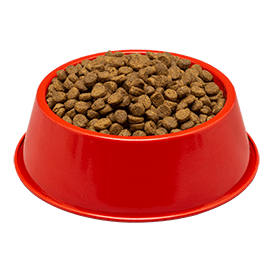
Transition to Redbarn food
Food Transition Schedule
Because dogs often eat the same diet for months or years, their digestive systems are not as adaptable as their pet parents. But that doesn’t mean you are stuck with the same food forever — the trick is to transition your dog slowly. By gradually replacing some of your dog’s current food with Redbarn’s food, you will help their stomach slowly adjust.
The exact amount of time to transition does depend on your unique pup. We recommend a one-week transition in total, helping them avoid digestive upset or tummy problems.
-

Day 1-2
Start by mixing 10 to 25 percent of Redbarn food in with your current food.
-

Day 3-4
Gradually increase to ½ Redbarn food, ½ current food.
-

Day 5-6
Gradually increase to ¾ Redbarn food, ¼ current food.
-

Day 7
Let your pup enjoy Redbarn food on its own.

Coming of age
They can’t stay our babies forever! Generally, puppies become adults when they are one or two-years-old. If you start by feeding your puppy food specifically formulated for puppies, ask your vet when your pup becomes an adult so you can transition to a dog food formulated for all life stages or adult maintenance.
-

Pregnancy / Nursing
Raising a litter of puppies is a lot of work! Pregnant or nursing dogs require energy-dense foods with a high percentage of calcium. This is rarely found in adult dog foods, however. Speak with your vet to identify the right time to begin transitioning your new mom to food formulated for pregnant dogs.
-

Therapeutic Dog Food
There is no one-size-fits-all approach when feeding our four-legged family members! If your veterinarian recommends a therapeutic dog food to help with a unique health condition, ask them to share any tips on transitioning foods.






